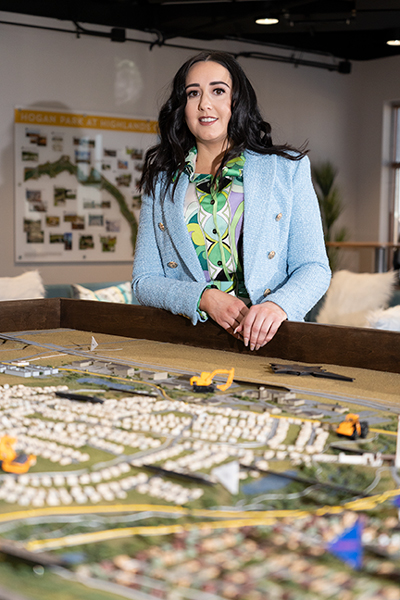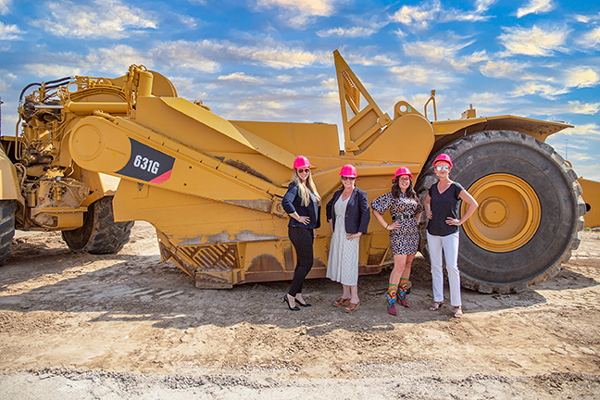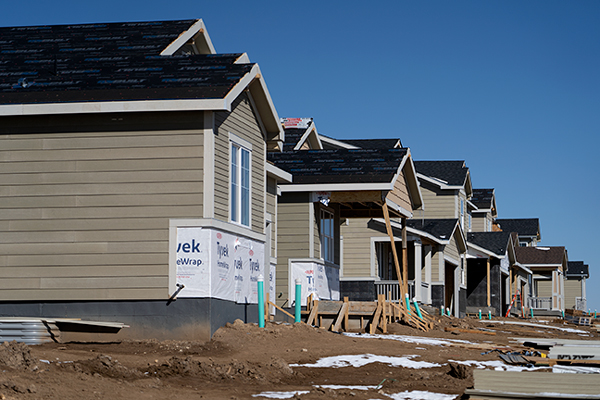NAILED IT: Female leaders in Colorado homebuilding take the reins on one of the region’s biggest developments
A cluster of pink hardhats isn’t a regular occurrence on most construction sites, but the Aurora Highlands housing development on the northeastern edge of the city isn’t a run-of-the-mill construction site.
The 4,000-acre development that will eventually include more than 12,000 residential units, add four new schools, house 60,000 people and supply thousands of new jobs is being largely developed by a group of women in leadership roles at local and major homebuilding companies.
“It was somewhat overwhelming for me to see so many female leaders for the builders that are participating in the Aurora Highlands,” said Ricarda Dietsch, president of Taylor Morrison Homes Mountain Region. “That’s a very, very unusual situation.”
Dietsch has been in the homebuilding industry for more than two decades, and like many women leaders in her position, she’s almost always the only woman in the room. Sometimes, she said, it’s not noticeable because it’s been the norm for so long. But when planning meetings started for the Aurora Highlands development over five years ago, Dietsch said it was very apparent that women would have a big hand in building one of the region’s biggest housing developments.
She described those first meetings as refreshing. Women in leadership roles often know that they bring a different perspective to the table, but this was happening in real time.
Five of the homebuilders working on the project are represented by women, and the pink hard hats available at the job site are a nod to strong women and embracing femininity in a mostly male-dominated field.

Carla Ferreira, Aurora Highlands co-owner and director of onsite development, sees women leadership in the project as one of many wins on the site since taking on the project with her father, Carlo Ferreira. The two are equal partners in the development, though she said people often think she’s her dad’s secretary when they show up to meetings together.
Ferreira said she’s had to fight for her place in the world of homebuilding, even with having her father as a business partner. Women have made that journey a bit easier, especially on tough days.
Becoming co-developer meant learning a whole new world for Ferreira, whose background is in art and anthropology. She moved to the development site to oversee the project long before any other building was happening. It was lonely, she said. But it was also empowering, like most everything else about the project.
“There were days where I was on the verge of tears. We were fighting oil and gas issues a couple years ago, and so I would go sit in these locked-door conference rooms. I would be the only woman in the room, and I would get yelled at by these older white men who didn’t agree with what I was saying,” she said. “But the moment that I would go back to my office, and I’d have a meeting with any of the women we work with, it just had this effect that would calm me because it was like I wasn’t competing for my place to be there.”
In the end, the Aurora Highlands struck a deal with oil and gas drillers to keep production away from homes in the area.

Provided photo by Valerie Rae
Like Ferreira, many of the women working on the Aurora Highlands said they’ve encountered questions and wrong assumptions about their work in homebuilding.
“I commonly receive the question, ‘Oh, did your husband start the homebuilding company? Did your family pass it down?’ And my response is always no, I have two business partners,” said Leslie Moen, co-founder, owner and president of Bridgewater Homes. “I always get the question of ‘well, most little girls don’t dream of being a homebuilder,’ for whatever reason, and it’s just something by chance for me, but I love it.”
In Colorado, the construction industry makes up about 7% of the workforce, according to state statistics. But the number of workers is expected to grow significantly. Labor experts believe that employment growth between 2020 and 2030 will be about 26%.
Women are likely to play a much larger role in that growth than ever.
According to Census data, 25% of the state’s 17,618 residential building workers are women. Overall, women make up about 19% of Colorado’s construction workforce. That’s higher than the national average. In 2020, women made up about 11% of the construction industry, which was a steady increase over the previous years, according to the U.S. Bureau of Labor Statistics.
Across all industries, women make up nearly 47% of the country’s labor force.
Christina Zavislan, a senior marketing manager at Mortenson and co-chair of the company’s women in construction resource group, said that over her 20 years in the construction industry she’s seen an increased respect for women in the field, which has been encouraging.
Slightly more than 30% of Mortenson’s employees are women, about three times the industry average. She credits the company’s commitment to mentorship for the high percentage, along with its intentional work on diversity and inclusion.
“It’s really made a huge impact in ensuring women have a voice,” she said.
Building a pipeline from education into the workforce is a key component to retaining more women. Zavislan was interested in construction from a young age, but said that when she pursued it in college she was made to feel like it wasn’t for her.
“I once walked into a classroom and a teacher asked me if I belonged,” she said.
Mortenson has partnerships with local colleges, including the University of Colorado and Colorado State University, to try to engage with more women and has a presence at job fairs at several school districts, including Aurora Public Schools.
Colorado is already experiencing a shortage of workers in the construction industry, and over the next 18 months Zavislan said the state is projected to have a significant increase in projects. And according to Build Colorado, 45,000 more workers will be needed in the state’s construction industry by 2027.
In this environment, “it’s imperative that we ensure that we have the right people, including women,” she said.

Photo by PHILIP B. POSTON/Sentinel Colorado
The women working on the Aurora Highlands echo what studies of women in the workplace have found: their differing perspectives make a difference and they’re good at collaborating with each other.
A 2013 National Bureau of Economic Research paper found that to be true, and the National Association of Women in Construction notes that’s a particular bonus in an industry of complex projects with lots of moving parts.
“From my perspective, it still continues to be a very male-dominated industry,” said Natasha Gandhi, division president at Richmond American Homes. “I think us women are just persistent and we’ve been bullish, and we continue to persevere in a male-dominated industry. I think the proof is in the pudding.”
Gandhi’s father was a general in the Indian army, so she said she and her sister were raised to be strong women. “You talk about no crying in homebuilding, there was just no crying,” she said of her childhood.
For Gandhi and Ricarda Dietsch at Taylor Morrison Homes and others who’ve had decades-long careers in homebuilding, there weren’t a lot of women they could call for advice, but they hope that will change for the next generation of leaders.
“At the start of my career, I often noticed females concentrated primarily in marketing and sales roles, which is where I began myself,” said Liesel Cooper, national president for Century Communities. “Now, I’m seeing more females involved across all divisions and roles. The industry will only grow and become further enriched by representation throughout all layers and verticals of a company.”



